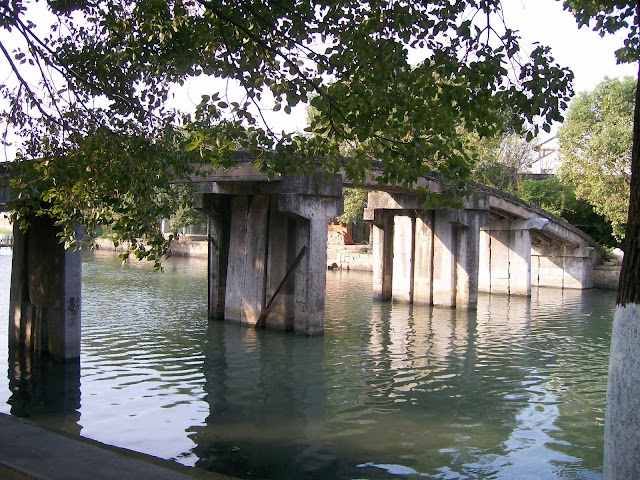Although I've just spent two weeks based in Shanghai, what I'll blog about first is the watery village of Jinze. Jinze (pronounced Gin Zeu– with long tone descending to rhyme with French 'peu') is about 80 miles from Shanghai but calm, rural and built around meanders of a river or a canal. Where exactly it is is still a mystery, as it was a late night mystery tour arranged by our gentle Chinese poet friend Xiao Kaiyu, to fill in the blank in our very sketchy 'programme'. Even Yang Lian doesn't know where it is, nor google, so it remains a dream of water, rain and rainbow bridges without sides that can be slipped on and over. I spent most of the journey trying to pronounce the name.
We arrived at night, and I slept in a vast room with ensuite jacuzzi and power shower room and an ensuite loo with heated toilet seat that raised its lid on approach. I woke at 5am and worked on my translations at the large trestle table before the windows, while waiting for dawn. When I opened the curtains I found I was next to a wide waterway swirling past my huge, wood-filigreed window. It had rained all night and the water seemed almost under the floor, and I wondered what happened during floods.
But it was a sunny day, so George Szirtes, Clarissa Upchurch and myself walked along the river/canal and over the numerous ancient arched bridges over it. At times the waterways forked. The complex we slept in was itself built between water, with water channels outside each door. We visited a Taoist temple and a Buddhist temple built around a 650 year old gingko tree strung with red lanterns. I think it was the first time I relaxed since I'd arrived in China, away from the cacophony of horns outside our Fudan University hotel.
We were led out onto terraces with views of the waterways and their bridges. Kaiyu pointed to a room where he comes to write and we were invited to return for a writing retreat, an invitation I almost took up, before I remembered how far it was from home, this land of water like woven silk, of silk like woven water, yellow gingko leaves strewn on the ground like confetti.
So back to the endless fifty-floor towers of Shanghai, via a visit to one of the founders of the Jinze Craft Museum, the quiet ex-artist Mr Hu, his champagne coloured poodles and talk of his friendship with Prince Charles and the royalty who have visited the Mystery for architectural design tips, before a dash for the rush-hour subway where we swayed with our luggage for hours before ascending at the Centre for the Oriental Arts, to another gift from Kaiyu – a concert by the fusion group Amrta, almost all women, and their spellbinding music. In my first row seat I waited and waited to hear the Erhu, a kind of two stringed fiddle, as it features in a poem of Kaiyu's I was translating, a powerful poem about his mother's ghost. I was not disappointed. It sounded hoarse, primeval and sad, and I can still hear it like the sound of water that has dried up.
Entrance to my bedroom was over a little bridge over the water channel
George Szirtes, Clarissa Upchurch and I, outside the breakfast room of 'The Big House'
The slippery sideless bridge!
A shrine to a village elder in the Taoist temple
My favourite dragon
650 year old gingko tree in Buddhist temple courtyard
cloud motif around dragon enclosure, gingko leaves inside
Yang Lian and George in the 'dragon' boat steered by a woman
Clarissa in the bridal sedan chair
Hidden meanings in Chinese children's clothing and accessories etc
3D embossed monster on Buddha cloak in museum
Miao mother and daughter weavers locked in museum hall

The two large wood filigree windows on ground floor were where I slept, the jacuzzi bathroom at the end on the left.
View of waterways from Jinze Craft Museum




























Fabulous photographs Pascale! Such a wonderful trip.
ReplyDeleteTerrific piece and great photos, Pascale!
ReplyDeleteExquisite photos - so beautiful - thank you! Daughter Zoe visited the water canals near Shanghai during her gap year in China back in 1995/6!
ReplyDeleteThank you Kathleen, George for your kind comments. I've been following and admiring your notes George, now that we're back. Penny, then perhaps they are canals! I wasn't sure if they were tamed rivers or wild canals!
ReplyDeletePxx
Start exploring the people...and then you will see China. Right now, you are seeing the display, a sheltered view...go off the beaten path, as I did when I lived and respected the people without even knowing a word of their language.
ReplyDeleteHi Marilyn,
ReplyDeleteI'm sure you're right, and lucky to have lived there. This is my third visit, fifth if I count reciprocal visits of Chinese poets to UK, and my sixth poet to start to translate, so may have begun exploring the people through their poetry, but it's a deep and ancient culture so will take much more than that. Thanks for your insight.
Wonderful photographs - felt like a movie in many ways. And very inspiring.
ReplyDelete